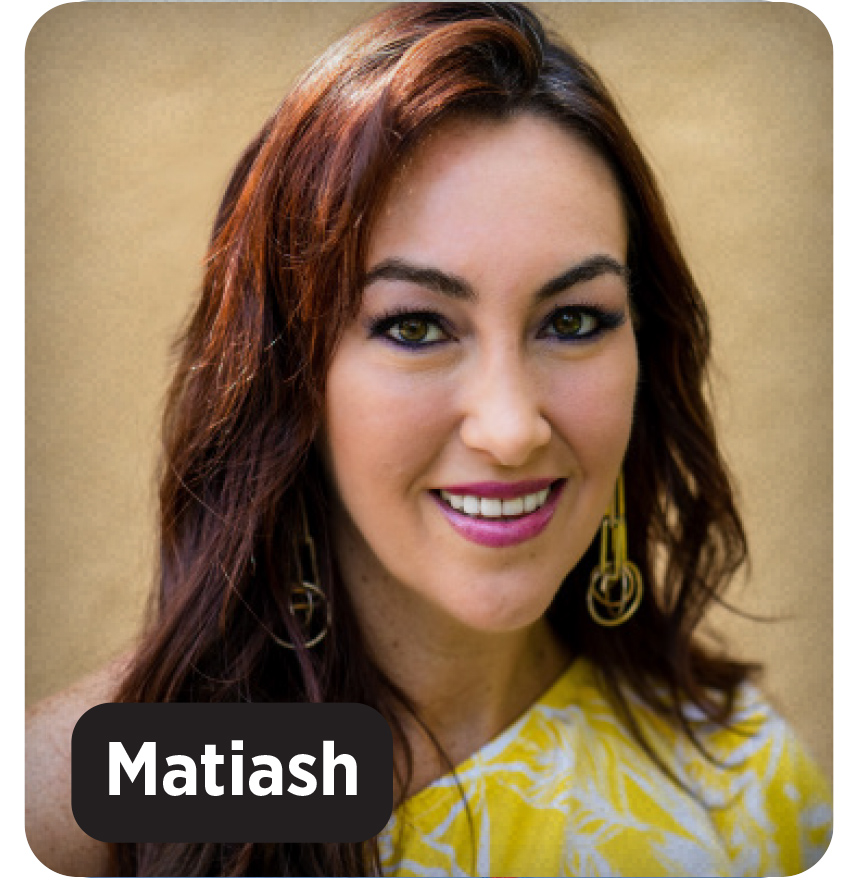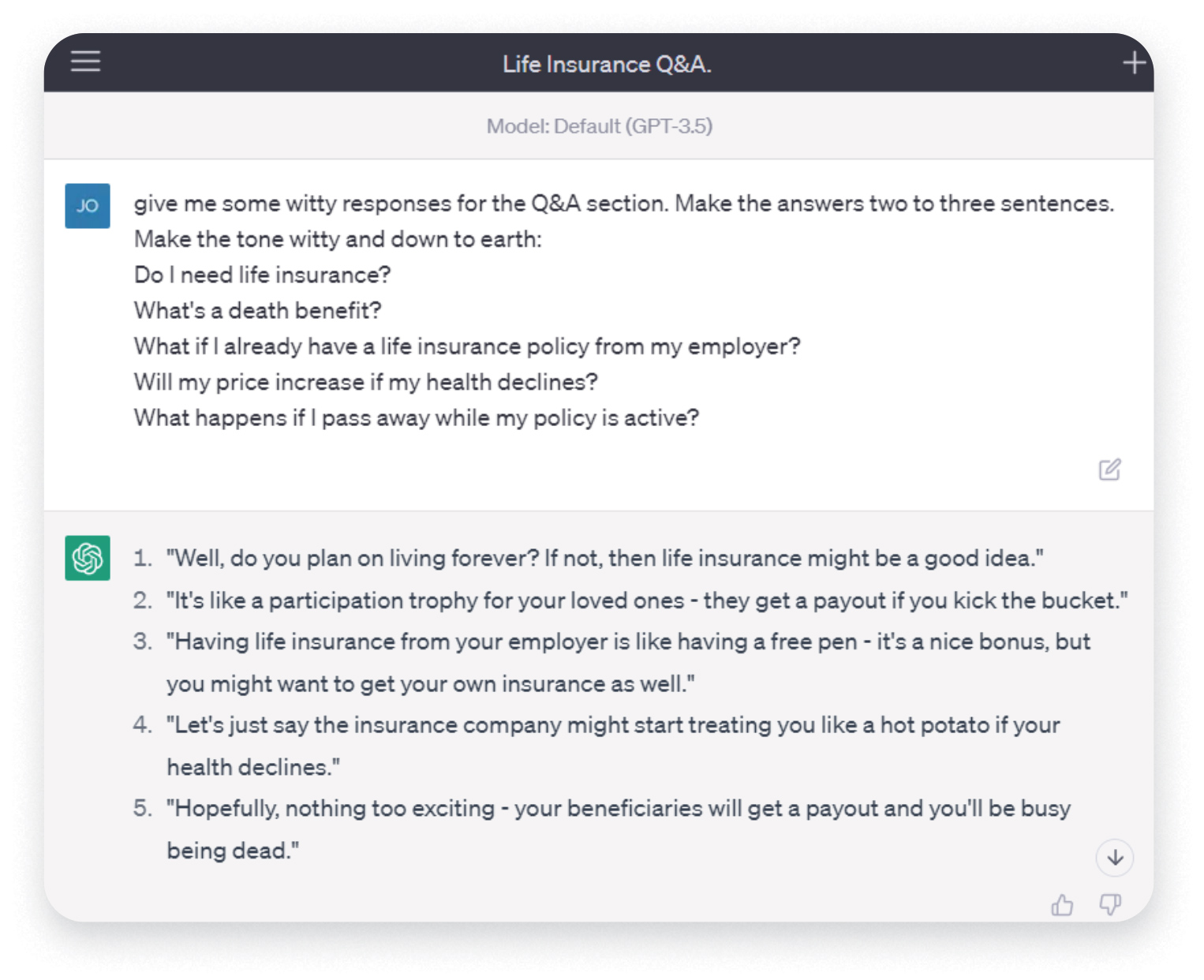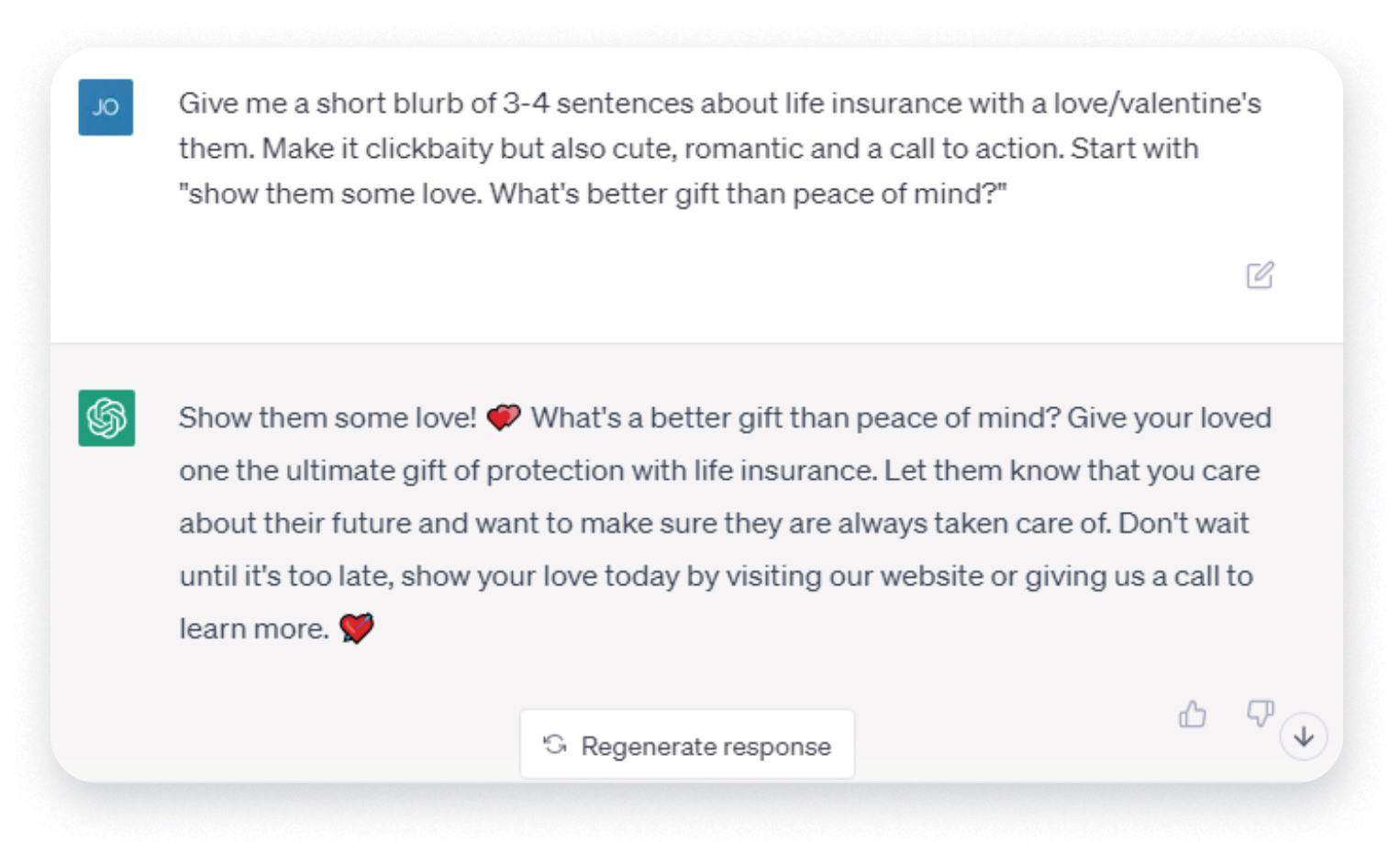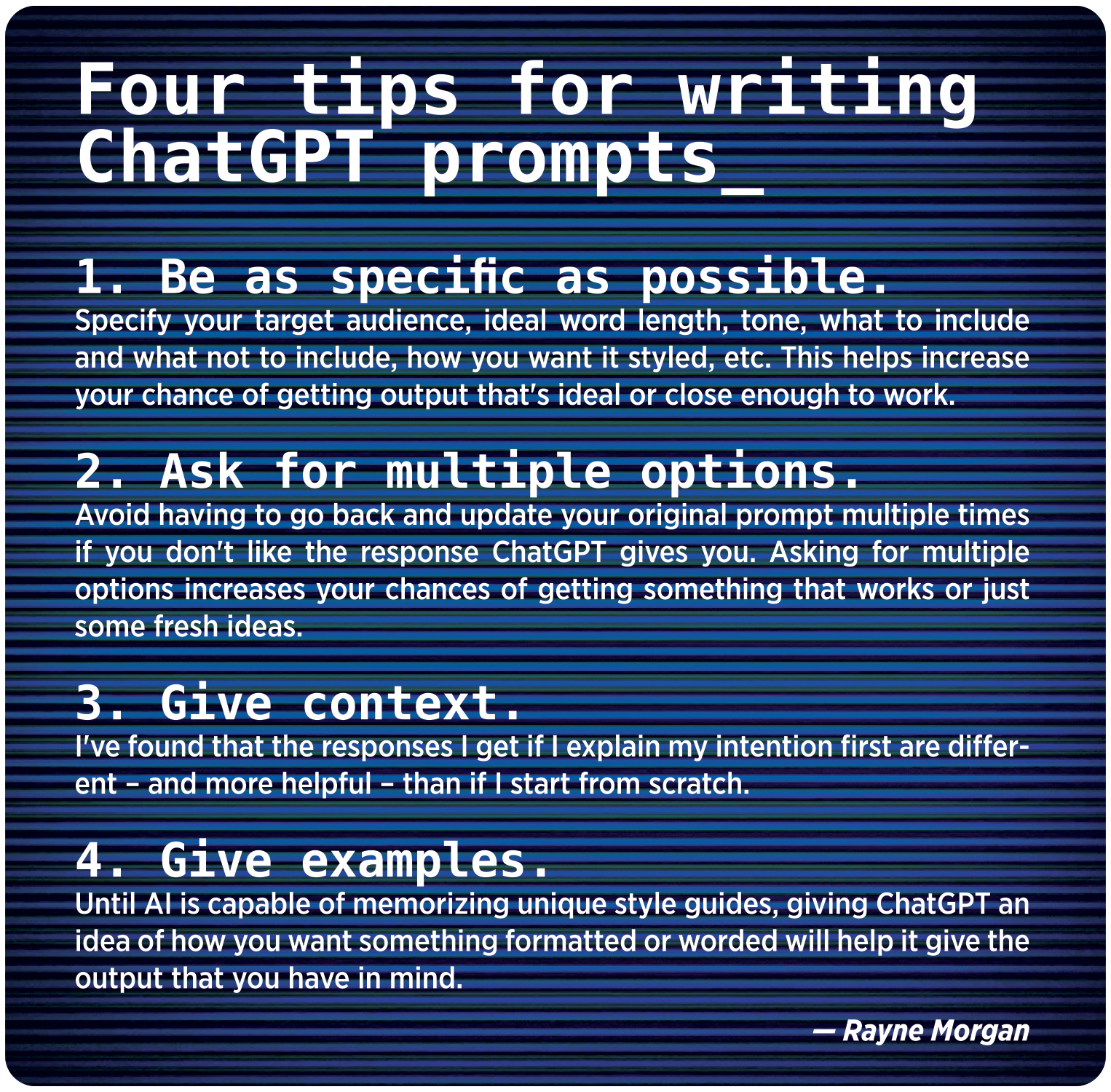The AI revolution: Spotlight on ChatGPT as AI seeks to reshape the world

Chat Generative Pre-trained Transformer, or ChatGPT, has become a household name. In the space of a few months, ChatGPT, an artificial intelligence chatbot developed by OpenAI and launched in November 2022, has taken the world by storm — including many corners of the insurance and financial services industries. Currently ChatGPT is all possibility, with many seeking to understand the reality of its capabilities — and its shortcomings.
The popularity of AI generative programs such as ChatGPT also can be seen in the sudden arrival of competitors, all long in the works but suddenly thrust into the spotlight due to ChatGPT’s notoriety. Google has launched Bard, to initial mixed reviews. Meta, Facebook and Instagram’s parent company, has launched Make-A-Video, an AI system that generates videos from text, and is planning other projects.
Others include IBM, with Watson, and Tesla. Essentially, there is a war taking place to see who will win the top spot in the AI world, much as Google won the search engine war years ago.
As the initial examination of these systems goes forward at high speed, many in the industry are trying it out. Their experiences inevitably have brought benefits, especially in the areas of idea generation, time savings and, to some extent, research, as well as in expediting mundane tasks including content outlines, editorial calendars, content briefs, FAQs, social media captioning and even search engine optimization.
We talked to some in the industry who have started kicking the tires of ChatGPT for these and other uses, as the power of generative AI becomes a time-saver, an ideation tool and, in some cases, an “assistant” for content teams.
‘An indispensable tool’

“However, it’s important to note that AI is just one part of the equation,” she said. “We still rely on fact-checking, research and customization to ensure that our content is unique, accurate and tailored to our audiences’ needs. AI is a powerful tool, but it’s the human touch that truly brings our content to life.”

“That all will get pushed to social channels, but if it’s on our website first, the SEO will generate traffic. Traffic begets leads and leads beget customers, which ultimately ends up in revenue for the business. We had done a lot of that through brute force over the last five years. Over the last 18 months, we were using Jasper and some other AI tools before we started using ChatGPT.
“One of the things that we’ve found with the AI tools and ChatGPT in particular is that if I have a question, I can first use ChatGPT to create an outline. I’ll ask ChatGPT, what kind of framework do I want to use? What are some key points that I want to make sure that I include?
Our secondary piece of software that we use, called Frase.io, allows us to pull in things like headers, titles, key points that other high-ranking websites are using. We marry those two sources together to come up with a framework of what we want our content to look like.”
Frase.io, Wadley said, has some “algorithms that are built into their software that allows me to juice up things for SEO purposes.”
Wadley said he has found that ChatGPT is by no means perfect.
“If you don’t have some amount of subject matter knowledge, you will 100% get your behind burned. If you’re asking about what makes the sky blue, it’s probably going to get that mostly right. When you’re talking about the intricacies of insurance and financial services, it can be a very detailed answer. And if it has not been fed the right information, it could absolutely be wrong.”

Wadley said because conditions on policies in one state can be completely different from conditions in another state, “you have that regionality issue that can be in play. For example, I live in hail country, and what goes on here is vastly different than what you see in coastal Oregon, where they don’t have hail. ChatGPT doesn’t know that, so you have to have some amount of subject matter knowledge to be able to leverage it: Is this giving me the right outline?
Is this giving me the right things to consider?”
Because of the possible errors, Wadley said he’s wary of using ChatGPT to author complete articles that he would publish. “You can use it — and we have — to write an introduction, maybe a transition between two items. I tested something about health insurance the other day. I had it create an outline and then I had it write a full-blown article. It was 2,200 words and had a great SEO optimization score. I am scared to death to publish that.” To publish something written by ChatGPT, said Wadley, “you’re going to have to fact-check.”

“We are using it for content, for social media, but also for our blog website as well,” said Morgan. “Now when I say we’re using it, let me break that down. We’re not 100% reliant on it.
The content team we have is pretty small. It’s just me and my colleague. We’ll have a meeting, we’ll put together a plan. For example, this is the social media post we want to have, these are the articles we want to have in a certain time frame — like in a week, two weeks, a month or however often. And once we brainstorm, then we’ll use ChatGPT like an assistant. We’ll say, OK, we have these ideas in mind of what we are going to do, and we ask ChatGPT to give some us ideas on the best way to do this.

“If we get to the point where we’re kind of stuck on what exactly to say, we’ll ask GPT the best way to phrase a certain thing. Or we’ll ask it, “How can I make it more friendly for social media? How can I make it more SEO friendly?”
Morgan said her team will also use it for brainstorming topic ideas as well.
“Let say it’s the month of May. We’ll ask ChatGPT, “What are some ideas that we can do?” Or if we want to do something for general insurance, what are some fun ideas that we could do? We don’t roll with everything that it gives us, but it doesn’t hurt just to plug it in and see if it comes up with something interesting.”
Morgan said she will also use analytics to unearth trends that may be good topic ideas. Once they have those topics, they may use ChatGPT to create content briefs.
“Because we’re such a small team, it was a bit time consuming for us to kind of go through content briefs for every single article. We want to do two or three articles in a two-day span. It’s a lot for two people.” So, by helping with the content briefs, ChatGPT provides a valuable time savings for the team, she said.
Can ChatGPT author articles successfully?

“Generative AI should never be used for the sole purpose of creating and copy-pasting content in these industries due to the higher probability of generating incorrect information,” said Maximoff, adding, “Instead, in these sectors, we prefer to use AI/ChatGPT as a data research and organizational tool that helps us speed up the content production processes without having a direct impact on what is produced. Generative AI is extremely powerful as a search, organizational and data research tool, and its use far extends the casual ‘write me a paragraph about X’ approach that most marketers prefer, and we certainly tend to avoid it, especially in the financial/insurance sectors.”

Morgan said her team had tried to have ChatGPT write articles, without much success. “We said, OK, we don’t want our competitors cranking out like a hundred articles a day because they’re just using AI for everything. So, let’s take a stab at it and see how it comes out. And honestly, I mean, not knocking its uses — it’s definitely useful, it’s definitely groundbreaking — but it’s not at the level where it can just crank out articles that are just ready to go and perfect just yet. It failed on every level. It would just repeat itself often, and it had factual errors. Or I would say, “‘Give me 1,500 words’ and it would give me 700 words.”
“The process of going back and fixing it was way more time consuming than just writing it ourselves,” she said.
The art of prompt writing
Morgan said that writing prompts correctly to get the results needed has taken some patience and practice.
“It has been challenging. It usually takes a couple of tries to get exactly what we’re looking for. I’ll have to go back and edit the prompt to be more specific. I end up writing about a paragraph of prompt instructions to get exactly what I want. I find that sometimes I’ve had to justify my request. I’ll start by explaining myself, and provide more context. I find that its answers also change based on how well I explain what I need.”
“To give you a specific example, we recently did an article about how suicide affects life insurance.” First, said Morgan, she asked ChatGPT for some examples of the kind of audience that would relate to the topic.
“It stopped me. It said, ‘You know, suicide is a very heavy topic. Please seek mental help.’ And I had to explain to it that I’m in the insurance industry, I’m writing an article about this, and I’m looking for some kind of guidance here. And then it said that it understood the context and could give me more of what I was looking for. So, in writing the prompts, I start by explaining my context first, what I’m actually trying to do. And then I spend about a paragraph being extremely specific. For example, how many words do I want? What kind of language do I want? Do I want it readable at like an eighth-grade level, a 10th-grade level, or is it for social media? Do I want emojis? Do I want hashtags?”
“It can be a little bit challenging sometimes,” she added.

“I was surprised how much information was either totally or partially inaccurate,” he states in the post.
“So far, it’s crazy bad,” he told InsuranceNewsNet, adding, “I have loads of examples of inaccurate information. I’m scared, frankly, that others will try and use it and not edit it correctly. It will get better. I truly believe that — but it might be a while.”
ChatGPT and social media
As with a number of others interviewed for this article, Morgan said her team uses ChatGPT for helping produce captioning for social media posts.
“We use it for social media captions. We tell ChatGPT that we’re having this post rolling out for Women’s History Month. Can you give us a cute caption about Women’s History Month for LinkedIn about insurance. If what I ask is very general, I’ll find that it’ll say something that is completely not what I’m looking for. I would have to ask it specifically for ways that women can empower themselves with insurance. I can’t just say ‘Women’s History Month on insurance.’ It’s never just a one-shot kind of deal where it gives me the perfect caption, and I can go and roll with it.”
Morgan said she also is looking to do some email marketing using ChatGPT. “We would ask, what’s a fun way that we could promote a certain subject, like how can we promote critical illness insurance? Or like February was Heart Health Month. How can we kind of incorporate that into a cute little email about critical illness.” ChatGPT can help brainstorm ideas to help generate email content.
She said her team is also thinking about using ChatGPT for TikTok. “We haven’t started TikTok yet, but we’re looking at it. How can I put this topic into a cute video for TikTok for a younger audience? That kind of thing.”
Marketing and email campaigns

“Recently, I have been using AI technology, such as ChatGPT, to help me in this endeavor. For example, I used ChatGPT to create a social media campaign focused on retirement planning. Using ChatGPT’s natural language processing capabilities, I was able to input the key messaging and target audience demographics. The AI system then generated a variety of social media post options that were tailored to the specific audience and messaging goals.
“ChatGPT has helped with more than just social media campaigns. It has also helped with making marketing materials. The AI system can look at a lot of data and trends and come up with insights and suggestions that I can use in my marketing efforts. Personalization of messages and content is a major benefit of adopting AI technologies such as ChatGPT.
“This can be done by segmenting audiences based on different characteristics such as age, income level and spending habits, and then creating messages that are specifically targeted toward those segments. The system can also analyze an individual’s past interactions with a company and use that information to create personalized marketing messages that speak directly to their needs and interests.
AI also can help financial advisors optimize their social media and marketing campaigns in real time, said Gallagher. “By monitoring engagement and performance metrics, I can adjust their messaging and tactics to ensure maximum impact.”
Incorporating AI such as ChatGPT into marketing and social media campaigns, he said, can help reach a wider audience, personalize messaging and optimize tactics for maximum impact. “As the financial industry becomes increasingly competitive, using AI technology will be crucial for advisors looking to stay ahead of the curve,” said Gallagher.

ChatGPT for SEO
When it comes to SEO, Wadley said the combination of ChatGPT along with Frase.io is very powerful. Frase.io describes its AI tool as “an intelligent automation and content optimization (content editor) tool that provides comprehensive insights (e.g., content gaps, target keyword, keyword research tool, content score).”
“This is where I lean heavily on the Frase.io side of the house rather than ChatGPT itself. If I get stuck with a headline, that’s where the AI can be fantastic. ChatGPT or AI can do a fantastic job as far as the optimization of the article itself. Frase.io has an algorithm that uses the results from all of the various webpages of the top 20 ranking pages for the keywords. It will compare your content based on those keywords, and based off of the number of headings, images and the length of the article. And it will give you a composite score to compare you against the other top 20 articles,” Wadley explained.
So what impact does this use of AI have on Wadley’s business?
“Why would I be so arrogant to think that I could compete against [generative AI] in this space? Well, one of the things that we run into here in north Texas is the insurance companies are now pushing actual cash value on roof claims from hail, which is really bad for consumers.
“I can go in and I can optimize [for search engines] because I know what specific search terms people are looking for in that arena. I can optimize a long tail phrase and I can rank number one in the entire world for that long tail phrase. And it can put a customer in my lead pipeline almost every day.”





Winning With Words — with author Mary Schmid
Life insurance companies ready for analysts to pick apart Q1 earnings
Advisor News
- Should financial advisors use AI? An expert weighs in
- Inflation and interest rates: Help clients navigate this terrain
- Americans increasingly worried about new tariffs, worsening inflation
- As tariffs roil market, separate ‘signal from the noise’
- Investors worried about outliving assets
More Advisor NewsAnnuity News
- AM Best Comments on the Credit Ratings of Talcott Financial Group Ltd.’s Subsidiaries Following Announced Reinsurance Transaction With Japan Post Insurance Co., Ltd.
- Globe Life Inc. (NYSE: GL) is a Stock Spotlight on 4/1
- Sammons Financial Group “Goes Digital” in Annuity Transfers
- Somerset Reinsurance Announces the Appointment of Danish Iqbal as CEO
- Majesco Announces Participation in LIMRA 2025: Showcasing Cutting-Edge Innovations in Insurance Technology
More Annuity NewsHealth/Employee Benefits News
- Proxy Statement (Form DEFC14A)
- ‘They won’t help me’: Sickest patients face insurance denials despite policy fixes
- Thousands of Missouri construction workers with Anthem health insurance left scrambling
- Don't let death penalty turn Luigi Mangione into a martyr
- More than 5M could lose Medicaid coverage if feds impose work requirements
More Health/Employee Benefits NewsLife Insurance News
- Proxy Statement (Form DEF 14A)
- Proxy Statement (Form DEFC14A)
- Who's who in Lori Vallow Daybell's trial in Arizona?
- 2024 ModeSlavery Report (bpcc modeslavery report 2024 en final)
- Exemption Application under Investment Company Act (Form 40-APP/A)
More Life Insurance News